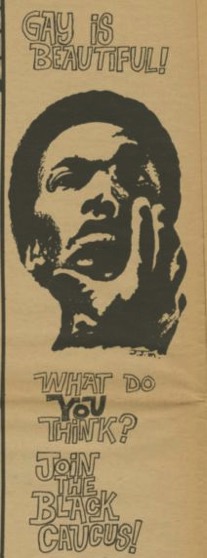Collection Spotlight: Gay Liberator
This blog post was contributed by Autumn Diaz, a student in Wayne State University's archives program in Winter 2017.
The Reuther Library holds many important historical collections, and as history inevitably repeats itself, many are more relevant than ever to current events. The Gay Liberator collection, in the space of just two compact boxes, offers a history unique to Detroit and its LGBT community. Published from 1970-1976, the Gay Liberator also reflects growing political awareness during an important time for the nation as a whole. The intersection of race, class, and sexual identity was experienced by many Detroiters of that era, but especially those on the margins of society.
In the first issue of the Gay Liberator, we see the support system that has been constructed and maintained by gay men and women of the metro Detroit area: social events are planned, trusted health care providers are recommended, safe spaces are advertised. By the second issue, largely neutral community discussion has been galvanized into a stronger sense of political responsibility. This group working for acceptance realizes that the desired normalization of their identity is inherently radical, as it will only be possible through “a basic change in society” [Gay Liberator, Vol. 1, No. 2 (May 1970)].
The gay liberation movement was taking root across the United States as a banding together of lesbian, gay, and transgender groups who realized they were fighting for the same cause. Groups like Detroit’s Black Caucus began to assert their ideas without fear, emboldened by America’s civil rights, socialist, and feminist movements. Within the pages of the Gay Liberator, they began to discuss the multiple layers of race, class, and sexual identity that affected their lives: “we are dealt with more severely than those ‘sissies’ who have inherited membership in the ruling class” [Gay Liberator, Vol. 1, No. 6 (November 1970)]. This criticism was encouraged and taken to heart: illustrations and advertisements in the Gay Liberator became increasingly aware of diversity issues with each new issue.
National political groups took notice of the gay liberation movement as well, the more radical groups treating them as an equal force, a faction of the same army. Reading through the November 1970 issue of the Gay Liberator, a surprising discovery for many is a letter written by Huey P. Newton, co-founder of the Black Panthers. In it, Newton urges his Panthers to overcome their fear and support gays and women as fellow revolutionaries: “We must gain security in ourselves and therefore have respect and feeling for all oppressed people.” As an extension of this respect, he recommends discontinuing the use of common gay slurs of the time. He further suggests that gays in particular may be an exemplary force to take note of: “And maybe I’m now injecting some of my prejudice by saying, ‘even a homosexual can be a revolutionary’. Quite the contrary, maybe a homosexual could be the most revolutionary.”
This in itself is enough to look into the Detroit Gay Liberator collection, but there is much more to be found. A rich variety of experiences are represented here, topics as varied as the movement itself: queer threads in straight culture are identified through literary criticism of Emily Dickinson, interpretations of the Kinks’ “Lola,” and music reviews of David Bowie’s latest Detroit appearance. One lesbian writer questions the heteronormative sexism inherent in her own experience of butch/femme culture, ending her essay with a call for feminist change. The Detroit Gay Liberator was fertile ground for passionate debate between the multifaceted and widely varying groups within the gay liberation movement, a place for manifestos, for changing minds, for radical questioning, and moving society to a better place. The Reuther Library allows us to access this extraordinary time in Detroit LGBT history.
Related collections:
Ernest L. Horne Papers
LGBT Detroit Records
South Eastern Michigan Gay and Lesbian Association Records


 Reddit
Reddit Facebook
Facebook LinkedIn
LinkedIn